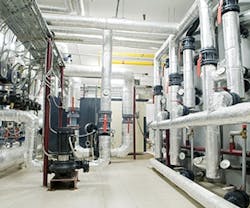Ensure Boiler Maintenance Avoids Energy Waste
Proper boiler maintenance boils down to a few simple strategies, but continual upkeep is essential to the safe, efficient operation of your system.
Step one is making sure the tubes and traps are clean and clear, thereby not hindering heat flow and wasting energy. It requires entering the boiler on both sides through the hinged doors. If you use natural gas – which burns cleanly – you likely won’t have much soot to clean if the burner is tuned properly. Burning #2 fuel oil generates more soot.
“With oil, you’ll have a small amount of particulates that deposit on the inside of tubes, and just like a chimney sweep, the soot must be brushed out,” advises boiler consultant Carl E. Linderoth.
You can also develop hard water deposits that require water treatment. Impurities in boiler water and returned condensate can cause corrosion and scale inside pipes, inhibiting heat and material flow.
“The deposits can be very detrimental long-term and can actually cause tube failures,” explains Linderoth, adding that water softener must be used to replace harmful calcium and magnesium ions with sodium. “Keeping an eye on your brine tank and filling it periodically is an important step.”
Another aspect of preventing corrosion involves de-aerating the water in the system, which gets rid of the dissolved gases – typically oxygen – present in city line water.
“If you have air in the water, it will cause corrosion because the tubes are made of iron – they’ll rust unless you get the oxygen out,” Linderoth says. “Making sure the de-aerator is functioning properly is part of a recommended annual inspection.”
Energy-wasting air leaks are also problematic. Ambient air that leaks into the boiler lowers efficiency – heated air that leaks out is wasted heat. Leaks frequently occur around seals, at the ends of tube bundles, and at access doors.
“Most systems operate under positive pressure, so if there’s a leak on the gas side it will actually push flue gas into the boiler room,” Linderoth adds.
Annual inspection and tuning ensure the fuel-air ratio is set at optimum levels. Linderoth uses a portable flue gas analyzer to study the oxygen content in flue gas and carbon and nitrogen emissions. This inspection is required for industrial sites for environmental reasons, but it’s also in an owner’s best interest.
“If you have excess air, you’re heating up air that goes out the stack. Then you’re wasting energy,” explains Linderoth. “The inspection isn’t just for environmental compliance – it minimizes fuel consumption.”
Lastly, it’s important to pay attention to the mechanical devices – gauges, safety interlocks, valves, ash-handling units, pumps, burners, and fans – to make sure seals are tight. These steps will ensure your machine is boiling instead of your blood.
